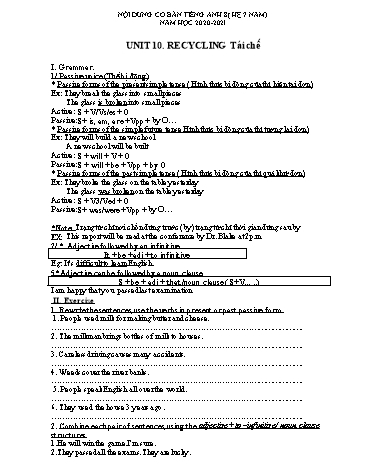Giáo án môn Tiếng anh Khối 8 (Hệ 7 năm) - Năm học 2020-2021
Bạn đang xem tài liệu "Giáo án môn Tiếng anh Khối 8 (Hệ 7 năm) - Năm học 2020-2021", để tải tài liệu gốc về máy hãy click vào nút Download ở trên.
Tóm tắt nội dung tài liệu: Giáo án môn Tiếng anh Khối 8 (Hệ 7 năm) - Năm học 2020-2021

NỘI DUNG CƠ BẢN TIẾNG ANH 8( HỆ 7 NĂM) NĂM HỌC 2020-2021 UNIT 10. RECYCLING Tỏi chế I. Grammar. 1/ Passive voice (Thể bị động) * Passive forms of the present simple tense ( Hỡnh thức bị động của thỡ hiện tại đơn) Ex: They break the glass into small pieces The glass is broken into small pieces Active: S + V/Vs/es + O Passive: S+ is, am, are +Vpp + by O * Passive forms of the simple future tense Hỡnh thức bị động của thỡ tương lai đơn) Ex: They will build a new school A new school will be built Active: S + will + V + O Passive: S + will + be + Vpp + by O * Passive forms of the past simple tense ( Hỡnh thức bị động của thỡ quỏ khứ đơn) Ex: They broke the glass on the table yesterday The glass was broken on the table yesterday Active: S + V3/Ved + O Passive: S+ was/were +Vpp + by O *Note: Trạng từ chỉ nơi chốn đứng trước (by) trạng từ chỉ thời gian đứng sau by EX: This report will be read at the conference by Dr. Blake at 2p.m 2/ *. Adjective followed by an infinitive It + be +adj + to infinitive Eg: It’s difficult to learn English. 5* Adjective can be followed by a noun clause S + be + adj + that /noun clause ( S+V..) I am happy that you passed last examination. II. Exercise 1. Rewrite the sentences, use the verbs in present or past passive form. 1. People used milk for making butter and cheese. . 2. The milkman brings bottles of milk to houses. . 3. Careless driving causes many accidents. . 4. Weeds cover the river banks. . 5. People speak English all over the world. . 6. They used the house 3 years ago . . 2. Combine each pair of sentences, using the adjective + to –infinitive/ noun clause structures. 1.He will win the game. I’m sure. 2.They passed all the exams. They are lucky. - sunbathe /ˈsʌnbeɪð/(v): tắm nắng - suggest /səˈdʒest/(v): gợi ý + suggestion /səˈdʒestʃən/(n): sự gợi ý - florist /ˈflɒrɪst/(n): người bỏn hoa - import /ɪmˈpɔːt/(v): nhập khẩu - revolutionary /ˌrevəˈluːʃənəri/(n): cỏnh mạng - seaside /ˈsiːsaɪd/(n): bờ biển - resort /rɪˈzɔːt/(n): vựng, khu nghỉ mỏt - oceanic /ˌəʊʃiˈổnɪk/(a): thuộc về đại dương - institute /ˈɪnstɪtjuːt/(n): học viện, viện nghiờn cứu - giant /ˈdʒaɪənt/(a): to lớn, khổng lồ - buddha /ˈbʊdə/(n): phật - offshore /ˌɒfˈʃɔː(r)/(n): ngoài khơi - island /ˈaɪlənd/(n): hũn đảo - accommodation /əˌkɒməˈdeɪʃn/(n): chỗ ở - realize /ˈriːəlaɪz/(v): nhận ra - make in (v): sản xuất tại - eternal /ɪˈtɜːnl/(n): vĩnh cửu - keep in (v): giữ - wrap in (v): gúi, bọc, quấn - tribe /traɪb/(n): bộ tộc, bộ lạc - slope /sləʊp/(n): sườn, dốc - jungle stream /ˈdʒʌŋɡl - striːm/(n): suối trong rừng II. Grammar 1.Present participle: Verb – ing : (Hiện tại phõn từ) EX: The boy reading a book is Ba. (V-ING ) Use: A present participle phrase can be used as an adjective to qualify a noun with active meaning - which ends in ‘-ing’, and the past participle, which usually ends in ‘-ed’. - We use the present participle to modify and clear meaning of nouns in front of it. Subject can cause the action of verb.For example. The boy reading a book is Ba. 2:Past participle ( Quỏ khứ phõn từ)
File đính kèm:
 giao_an_mon_tieng_anh_khoi_8_he_7_nam_nam_hoc_2020_2021.doc
giao_an_mon_tieng_anh_khoi_8_he_7_nam_nam_hoc_2020_2021.doc

